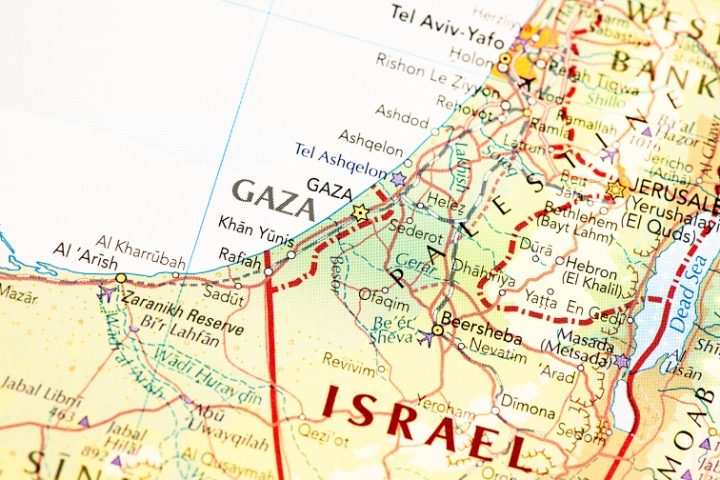
Israeli Prime Minister Benjamin Netanyahu claimed on November 6 in an interview with ABC News that Israel will have to oversee “overall security” in Gaza for an “indefinite” period of time after its present conflict with Hamas ends.
In the interview, Netanyahu was questioned about Israel’s long-term plans for the territory should it eventually eradicate Hamas, suggesting the need for a lengthy deployment.
“I think Israel will, for an indefinite period, have the overall security responsibility [in Gaza] because we’ve seen what happens when we don’t have it,” he replied. “When we don’t have that security responsibility, what we have is the eruption of Hamas terror on a scale that we couldn’t imagine.”
The Israeli leader’s remarks seem to go against past comments from senior Israeli officials.
In declaring a major ground assault on the Palestinian enclave last month, Defense Minister Yoav Gallant pointed out that Israeli troops must not be responsible for “day-to-day life in the Gaza Strip.”
Although the official said Israel would set up a new “security reality” in the area after the current conflict, he hinted that it would try to delegate post-conflict governance to a third party.
Netanyahu adviser Mark Regev subsequently told CNN that Israel was “not talking about any sort of ongoing occupation of the Gaza Strip.” While he maintained there would be an Israeli “security presence” in the area, he said “that doesn’t mean that Israel is there to govern the Gazans.”
American soldiers will not be deployed to Gaza during or after the current phase of the Israeli-Palestinian conflict, the White House declared during a November 1 press briefing disavowing speculations that U.S. troops could be sent to Gaza on a peacekeeping mission.
White House National Security Council spokesman John Kirby was asked if U.S. forces would be mobilized to “stabilize the situation” in Gaza. “There’s no plans or intentions to put US military troops on the ground in Gaza, now or in the future,” he said. “But we are … talking to our partners about what post-conflict Gaza should look like.”
Kirby proceeded to reveal that officials were contemplating “some sort of international presence” after fighting dies down in Gaza, but pointed out that no decisions on the issue had been made.
The spokesman’s statements came after Bloomberg reported that Washington and Israel were exploring whether to give “temporary oversight [of] Gaza to countries from the region, backed by troops from the US, UK, Germany and France.”
Bloomberg added that the plans were still in their early phases, and that at least two other options were also being tabled, including involvement by the United Nations.
While Kirby rebuffed the notion of a U.S. peacekeeping mission, he reiterated previous comments from the White House that Hamas “can’t be the future of governance in Gaza,” backing Israel’s military operation to eliminate the terrorist group.
U.S. President Joe Biden has reportedly urged Netanyahu to pause attacks against Hamas for three days, saying such a halt to the fighting in Gaza could enable negotiators to secure the release of more hostages, as per a report by Axios on November 7.
Under a proposal being discussed between the U.S., Israel, and Qatar, Hamas would liberate 10 to 15 hostages during a three-day pause and confirm the identities of its remaining captives.
Next, the terrorist group would provide a list of those hostages, Axios said, citing an unnamed U.S. official.
During a phone call on November 6, both Biden and Netanyahu reportedly discussed the proposal, Axios claimed.
While continuing to object to a general ceasefire in Israel’s war with Hamas, U.S. officials have repeatedly recommended in recent days that tactical pauses could be leveraged to free hostages, obtain more humanitarian aid for Gaza, and enable more Palestinian civilians to evacuate areas where Israel’s incursions and bomb strikes have occurred.
For his part, Netanyahu has dismissed the possibility of a ceasefire, claiming calls for such a halt to the fighting are “calls for Israel to surrender to Hamas.” He has insisted that all of the approximately 240 hostages held by Hamas be released before any notion of a ceasefire can be explored.
Hamas fighters killed an estimated 1,400 people during the October 7 surprise attacks against southern Israel, and the group claims to have taken enough hostages to obtain the release of all Palestinians held in Israeli jails.
Four of the hostages, including two Americans, have been released, and Israeli troops rescued a soldier who had been captured by Hamas. The group claimed in a recent statement that it was prepared to release 12 foreign nationals, but was unable to do so due to Israeli airstrikes and ground attacks.
Netanyahu told Biden that he did not trust Hamas and did not think the group was prepared to agree to a hostage deal, Axios said, citing unidentified U.S. and Israeli officials.
The Israeli leader also suggested that Israel might lose international support for its incursion during a three-day pause.
Further, a ceasefire would hinder efforts to free more hostages, Netanyahu told ABC. “The only thing that works on these criminals in Hamas is the military pressure that we’re exerting,” he posited.
That being said, while vocally backing Israel’s military operation against Hamas, Washington cautioned against the dangers of another Gaza occupation. During a recent interview with CBS, Biden said the move would be a “big mistake.”
“It would be a mistake … for Israel to occupy … Gaza again,” he said. “But going in … but taking out the extremists, Hezbollah is up north but Hamas down south, is a necessary requirement.”
The White House has voiced concerns over the possible “reoccupation” of Gaza, after Israel’s prime minister indicated that Israeli forces would have “overall security responsibility” in the area following the conflict with Hamas.
Asked during an interview with CNN on November 7 to weigh in on the long-term plans for Gaza, Kirby urged Israel to reconsider a long-term military deployment.
“The president still believes that a reoccupation of Gaza by Israeli forces is not good. It’s not good for Israel; not good for the Israeli people,” Kirby said without providing more details.
“One of the conversations that Secretary [of State Antony] Blinken has been having in the region is what does post-conflict Gaza look like? What does governance look like in Gaza? Because whatever it is it can’t be what it was on October 6. It can’t be Hamas.”
Israel first occupied Gaza during the 1967 Six-Day War with Egypt, Jordan, and Syria, and only withdrew its troops and settlers almost 40 years later. It has overseen a strict blockade over the enclave in the years since, and has launched sporadic bombing campaigns against Hamas since the group assumed control of Gaza in 2006.
The latest round of violence broke out last month following a Hamas terrorist attack that killed around 1,400 Israelis. In turn, the Israel Defense Forces, or IDF, has conducted weeks of retaliatory airstrikes and gradually intensified a ground attack on Gaza, killing over 10,000 Palestinians, according to local officials.




